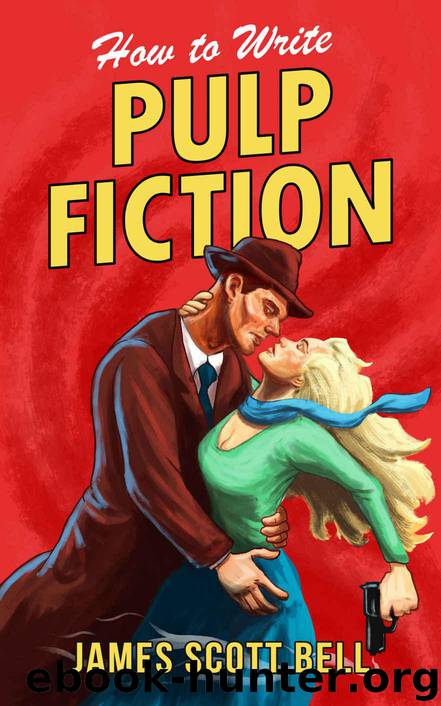How to Write Pulp Fiction by James Scott Bell

Author:James Scott Bell
Language: eng
Format: mobi, epub, azw3
Publisher: Compendium Press
Published: 2017-10-30T07:00:00+00:00
PUBLISHING STRATEGIES
You’ve got your pulp story or novella or novel ready for prime time. You’ve had the piece looked at and edited (refer back to the chapter “Conditions for Success”).
What do you do now?
You get it published.
Where?
You have two choices: traditional venues and do-it-yourself.
Traditional
If you have a full-length novel and want a publishing house to partner with, you’ll need to learn how to write a proposal you can submit either to an agent or an editor. This is a subject that I cover fully in The Art of War for Writers (Writer’s Digest Books). There is also abundant advice available for free on the internet.
Just be aware of a few items:
1. Not all agents are good, and a bad agent is worse than no agent.
2. Publishing contracts are a minefield for the uninformed. So either get informed or a good agent or a good Intellectual Property lawyer to go over the contract. The clauses you want really want to notice are the Non-Compete and Reversion of Rights. On the former, make sure you aren’t prevented from putting out stories or novels on your own if you so desire. On the latter, tie the reversion clause to a minimum of royalty income per every six months. $500 minimum.
3. Your publisher might go out of business.
4. Your cut of the proceeds will be around 25%.
5. You will have to do most of your own marketing.
For shorter pulp works, as of the time of this writing (oh citizens of the future) there are still some print outlets for genre fiction. The most popular are: Alfred Hitchcock’s Mystery Magazine, Ellery Queen Mystery Magazine, and Suspense (mystery, suspense, thriller), Asimov’s Science Fiction, and Analog (science fiction and speculative fiction).
Self-Publishing
From the start of the digital publishing revolution—which officially began with the introduction of Amazon’s Kindle in November, 2007—I wrote that this feels like a new era for pulp fiction. Authors began turning out genre stories and novels and publishing them on Amazon for 99¢.
In other words, abundant and cheap fiction.
What was missing, of course, was the curation of competent editors. The old pulp magazines had literate and savvy publishers, the best of whom could spot and nurture talent. Not so the Amazon marketplace, which was open to all.
Which meant, because of Sturgeon’s Law, that the market would be flooded with crap. Sturgeon’s Law holds that 90% of everything is crap. What a good editor tries to do is weed out that 90%.
Those early years of digital self-publishing saw a tsunami of bad writing, bad covers, and bad reviews.
But then … the cream began to rise.
A writer named Hugh Howey scored big with his series of short sci-fi works. They drew a following. Why? Because they were good. That following led to a collection that became Wool, a self-publishing sensation.
Other writers began to attract a following, with the pulp formula of fast + quality. Quality being defined as something readers are glad they read.
These successful authors wrote novels (50k words or more), novellas (20k +), novelettes (7k +), short stories (1k +).
Download
How to Write Pulp Fiction by James Scott Bell.epub
How to Write Pulp Fiction by James Scott Bell.azw3
This site does not store any files on its server. We only index and link to content provided by other sites. Please contact the content providers to delete copyright contents if any and email us, we'll remove relevant links or contents immediately.
Asking the Right Questions: A Guide to Critical Thinking by M. Neil Browne & Stuart M. Keeley(5771)
Autoboyography by Christina Lauren(5234)
Eat That Frog! by Brian Tracy(4535)
Dialogue by Robert McKee(4400)
Sticky Fingers by Joe Hagan(4195)
Journeys Out of the Body by Robert Monroe(3624)
Annapurna by Maurice Herzog(3467)
Full Circle by Michael Palin(3447)
Schaum's Quick Guide to Writing Great Short Stories by Margaret Lucke(3378)
Elements of Style 2017 by Richard De A'Morelli(3349)
The Art of Dramatic Writing: Its Basis in the Creative Interpretation of Human Motives by Egri Lajos(3067)
Atlas Obscura by Joshua Foer(2961)
Why I Write by George Orwell(2951)
The Fight by Norman Mailer(2939)
The Diviners by Libba Bray(2935)
In Patagonia by Bruce Chatwin(2927)
The Mental Game of Writing: How to Overcome Obstacles, Stay Creative and Productive, and Free Your Mind for Success by James Scott Bell(2908)
Venice by Jan Morris(2573)
The Elements of Style by William Strunk and E. B. White(2473)
